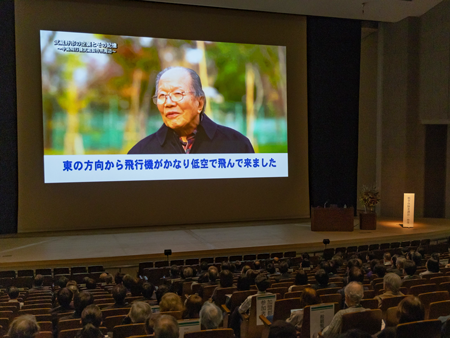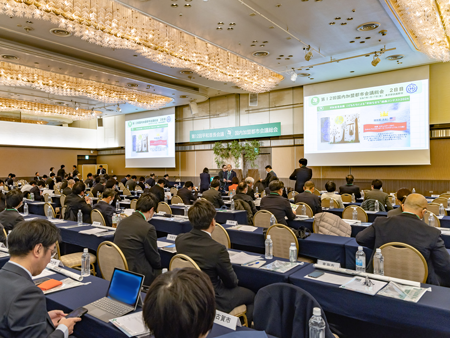The Mayors for Peace Japanese Member Cities Meeting in Musashino City: A Starting Point for Nationwide Peace Education
The Mayors for Peace Japanese Member Cities Meeting was held in Musashino City, Tokyo, January 16-17, 2025, with the participation of 100 cities, marking the 80th anniversary of the atomic bombings and the end of World War II.
On the first day, an event titled "Peace from Musashino", organized by Musashino City, was held. The program focused on how to pass on war experiences to future generations.
The event began with a wonderful performance by a children's brass band, followed by a video titled "Connecting the Memories of War to a Peaceful Future" featuring messages from four war survivors, including hibakusha. The video conveyed that Nakajima Aircraft Company, a leading aircraft manufacturer located in Musashino City at the time, was subjected to nine air raids, resulting in many civilian casualties. It also highlighted that, after the war, hibakusha from Hiroshima and Nagasaki settled in Musashino City and formed the Musashino Keyaki Association to carry out awareness-raising activities. Although the association once had over 100 hibakusha, that number has now declined to fewer than 30, and the core of its activities is gradually shifting to the second- and third-generation members. Yoshino Oishi, a photographer and Musashino resident, gave a lecture titled "Overcoming the Tragedy of War", in which she vividly conveyed, through her photography, the tragedies of people who had experienced war in various parts of the world.
 On the second day, reports were presented on peace-related initiatives.
The Tokyo Tama Regional Peace Network (the branch of the Mayors for Peace), which comprises all 26 cities in the Tama region, announced plans to send the "Tama Region Peace Youth" (tentative name), a group consisting of one high school or university student from each city, to Hiroshima.
These students are also scheduled to present policy proposals at the "Peace Summit" (tentative name) to be held in Tama City in February 2026.
Koga City in Fukuoka Prefecture highlighted the importance of experiential learning about historical events through the production and study of the picture book The Story of Tetsu Nakamura and through school excursions to Nagasaki, Hiroshima, and Chiran.
Obu City in Aichi Prefecture reported on sending junior high school students as peace ambassadors to Okinawa and atomic-bombed cities.
Kyoto City shared its initiatives for and the significance of the Month for a Culture of Peace, which offers an opportunity to reflect on the value of peace.
On the second day, reports were presented on peace-related initiatives.
The Tokyo Tama Regional Peace Network (the branch of the Mayors for Peace), which comprises all 26 cities in the Tama region, announced plans to send the "Tama Region Peace Youth" (tentative name), a group consisting of one high school or university student from each city, to Hiroshima.
These students are also scheduled to present policy proposals at the "Peace Summit" (tentative name) to be held in Tama City in February 2026.
Koga City in Fukuoka Prefecture highlighted the importance of experiential learning about historical events through the production and study of the picture book The Story of Tetsu Nakamura and through school excursions to Nagasaki, Hiroshima, and Chiran.
Obu City in Aichi Prefecture reported on sending junior high school students as peace ambassadors to Okinawa and atomic-bombed cities.
Kyoto City shared its initiatives for and the significance of the Month for a Culture of Peace, which offers an opportunity to reflect on the value of peace.
Afterwards, a presentation on "Support Measures for Member Cities' Peace-Related Initiatives," focusing particularly on peace education for younger generations was made. And the following five points were explained.
 The main points of discussion at the meeting were as follows: Mayor Omino of Musashino City, the host city, stated, "The greatest challenge going forward is to use various methods to deliver peace education that helps younger generations truly grasp the reality of war."
Mayor Watanabe of Higashimurayama City remarked: "War, especially nuclear war, causes the great violation of human rights. In human rights and peace education, we must place even greater emphasis on the message that discrimination must never be allowed."
Mayor Otsubo of Hino City commented: "Implementing peace education is a universal issue that transcends political party lines and is expected of all local governments. To advance this effort, it is essential to receive cooperation and support from nationwide coalitions such as the Japan Association of City Mayors and the National Association of Towns and Villages."
The main points of discussion at the meeting were as follows: Mayor Omino of Musashino City, the host city, stated, "The greatest challenge going forward is to use various methods to deliver peace education that helps younger generations truly grasp the reality of war."
Mayor Watanabe of Higashimurayama City remarked: "War, especially nuclear war, causes the great violation of human rights. In human rights and peace education, we must place even greater emphasis on the message that discrimination must never be allowed."
Mayor Otsubo of Hino City commented: "Implementing peace education is a universal issue that transcends political party lines and is expected of all local governments. To advance this effort, it is essential to receive cooperation and support from nationwide coalitions such as the Japan Association of City Mayors and the National Association of Towns and Villages."
Furthermore, Mayor Matsui of Hiroshima City, the President of Mayors for Peace, remarked: "This meeting has become an opportunity to advance peace through administrative efforts. I hope this year will serve as a starting point for nationwide education initiatives aimed at building peace."
On the first day, an event titled "Peace from Musashino", organized by Musashino City, was held. The program focused on how to pass on war experiences to future generations.
The event began with a wonderful performance by a children's brass band, followed by a video titled "Connecting the Memories of War to a Peaceful Future" featuring messages from four war survivors, including hibakusha. The video conveyed that Nakajima Aircraft Company, a leading aircraft manufacturer located in Musashino City at the time, was subjected to nine air raids, resulting in many civilian casualties. It also highlighted that, after the war, hibakusha from Hiroshima and Nagasaki settled in Musashino City and formed the Musashino Keyaki Association to carry out awareness-raising activities. Although the association once had over 100 hibakusha, that number has now declined to fewer than 30, and the core of its activities is gradually shifting to the second- and third-generation members. Yoshino Oishi, a photographer and Musashino resident, gave a lecture titled "Overcoming the Tragedy of War", in which she vividly conveyed, through her photography, the tragedies of people who had experienced war in various parts of the world.

Listening to testimonies by war survivors
(Photo: Musashino City)
Afterwards, a presentation on "Support Measures for Member Cities' Peace-Related Initiatives," focusing particularly on peace education for younger generations was made. And the following five points were explained.
- "Peace culture" and "peace education", which fosters civic awareness, work in synergy to reinforce each other in a positive spiral.
However, as the generation with a high level of peace awareness is decreasing, there is a strong sense of urgency that unless such awareness is effectively fostered among younger generations, a negative spiral may occur, making it difficult to sustain peace culture.
- Therefore, peace education for younger generations has emerged as an urgent and common issue across all regions of Japan.
- It has been shown that engaging in peace education at atomic-bombed sites or former battlefields allows participants to directly grasp the realization of the atomic bomb and war, both of which are the very antithesis of peace. Such experiences can lead to a shift in awareness, helping people think that peace is not something to be taken for granted, but something precious. These thought often serve as major turning points, fostering stronger peace awareness and encouraging action.
- In this context, in order to advance the initiatives of member cities, Hiroshima City is considering establishing a grant program, supported by national subsidies, to help cover the costs of sending young peace leaders to participate in the Peace Memorial Ceremony in Hiroshima and attend related peace education programs.
- As a result of these developments, over 1,800 people from 100 cities have applied to join the FY2025 Hiroshima Peace Study Acceptance Program, marking a significant increase in participation from member cities. Nagasaki City is also actively promoting participation in the Youth Peace Forum, held at the time of its memorial ceremony.
In response to this, the Japanese Member Cities Meeting unanimously adopted the "proposal for the development of peace education for the younger generation starting from the 80th anniversary of the end of World War II."
This signifies a shift from previously individual efforts to a more coordinated approach.
With the active participation of member cities and the establishment of a grant program supported by national subsidies, a structure and framework have now been put in place to promote peace education.
The creation of this framework marks a starting point for peace education to be addressed as part of the national administrative agenda, and it is positioned as one of the legacies of the 80th anniversary of the atomic bombings and the end of the war.- Therefore, peace education for younger generations has emerged as an urgent and common issue across all regions of Japan.
- It has been shown that engaging in peace education at atomic-bombed sites or former battlefields allows participants to directly grasp the realization of the atomic bomb and war, both of which are the very antithesis of peace. Such experiences can lead to a shift in awareness, helping people think that peace is not something to be taken for granted, but something precious. These thought often serve as major turning points, fostering stronger peace awareness and encouraging action.
- In this context, in order to advance the initiatives of member cities, Hiroshima City is considering establishing a grant program, supported by national subsidies, to help cover the costs of sending young peace leaders to participate in the Peace Memorial Ceremony in Hiroshima and attend related peace education programs.
- As a result of these developments, over 1,800 people from 100 cities have applied to join the FY2025 Hiroshima Peace Study Acceptance Program, marking a significant increase in participation from member cities. Nagasaki City is also actively promoting participation in the Youth Peace Forum, held at the time of its memorial ceremony.

Scene from the General Conference
(Photo: Musashino City)
Furthermore, Mayor Matsui of Hiroshima City, the President of Mayors for Peace, remarked: "This meeting has become an opportunity to advance peace through administrative efforts. I hope this year will serve as a starting point for nationwide education initiatives aimed at building peace."
(Peace Culture Planning Division)